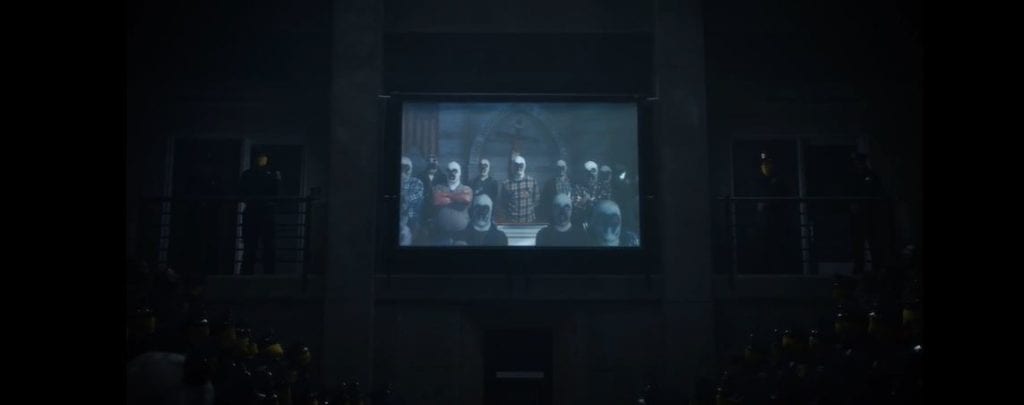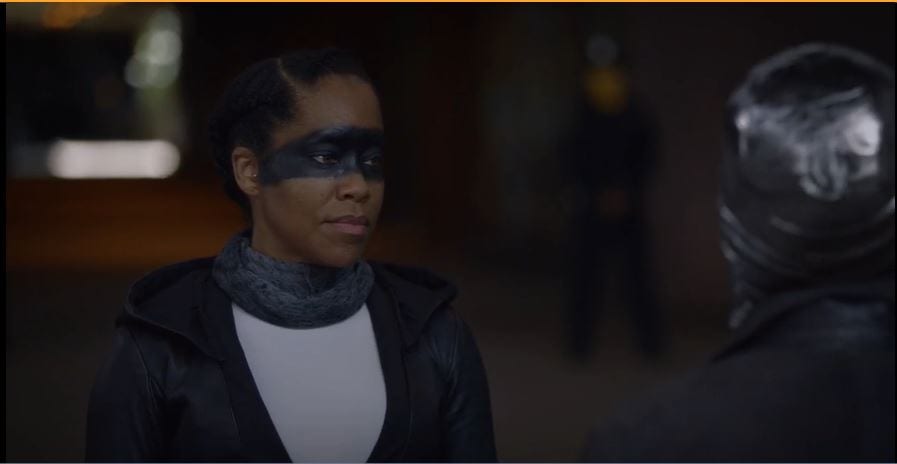Twitter users might notice that following the Watchmen premiere on HBO, the hashtag #TulsaMassacre began to trend. That’s because Watchmen began its series premiere with a flashback to Tulsa, Oklahoma in 1921 and a horrific crime where a violent mob of white residents rampaged through black neighborhoods, murdering and destroying as they went. Many people had not heard of this before last night. There’s a reason for that. It is exactly the kind of horrific violence against non-whites in America that the white historians and white politicians try desperately to cover up.
While this almost disconnected scene serves the purpose of introducing a character who only features briefly in the modern-day story, it was the perfect way to kick off what Damon Lindelof and his writing team made clear about this show in its first episode. Too often, we have ignored racism. Even worse, we have actively tried to cover it up. America has never truly had a real conversation about the racist crimes of its past. We don’t hear about them in history books.
Watchmen used its strange, confusing, wonderful first episode to make one thing clear; America needs to have this conversation, even if we have to have it using a TV show with baby squid rain.
Unsurprisingly, this episode inspired a backlash from people who hold the mind-boggling opinion that a Watchmen show shouldn’t be political or racial. Even more so, there is a backlash for making Rorschach the inspiration for a white supremacist terrorist group. Watchmen takes place in Tulsa in 2019, in an alternate-universe continuation of Alan Moore’s graphic novel. Police wear masks to protect their identities from the public. A group called the 7th Cavalry serves as their biggest threat. This group wears Rorschach masks and uses his quotes from throughout the graphic novel.

After a three year disappearance, the Cavalry returns and reignites a war with the cops which takes up much of this episode.
There are naturally many questions in the aftermath of this episode. Why do the cops wear masks and hide their identities? How long have the Cavalry been around? What exactly is going on in the world right now? Why is Robert Redford president? What in the world was the baby squid rain?
In true Lindelof style, you can bet that the answers to these questions will gradually unveil over the course of the season. Those who have read Moore’s masterpiece will have an idea of what is going on. Ultimately, though, the point of this pilot was to throw us into a chaotic, violent world of racial tensions. Watchmen is asking questions and making us face realities inherent to the world today. Huh, almost like the Watchmen novel did. Funny, that.
Right now a lot of the focus is on the obvious black vs. white conflict which was glaringly obvious throughout the episode. Tulsa’s citizens were overwhelmingly people of color. The police force was as well. There were more people of color on screen in this one episode than you would see in the entirety of other shows. The Cavalry, of course, is completely white. Even more, they were completely white men. I can’t recall seeing a single woman among their ranks.
The relevance to the racial problems of modern America couldn’t be clearer. After all, it’s white supremacist men who are committing acts of domestic terrorism multiple times a year. I also think it speaks volumes that a police force consisting mostly of people of color has to hide its face to enforce the law. Lindelof made a very interesting and poignant choice there, I think, one asking questions not just about the nature of vigilantism but also race.
America currently exists in a fragile state of racial politics. Racism has reemerged in the forefront of society in a way that many of us foolishly believed we had moved past. There’s an ugly side to this country that has always been here and that we are being reminded of every day now. Watchmen looks determined to make us confront not just modern racism, but the ugly history of it and how racism ties into authoritarian movements throughout history.
This first episode begins to pose serious questions about the nature of authoritarianism and individual freedom, one of the central questions of the graphic novel. What do we give up to be safe? What price is our freedom worth? How do vigilantes place stress on the laws which build society? By making the Tulsa police force so overwhelmingly not white, Lindelof has made this question considerably more complex than the usual stories of white police forces oppressing non-white communities.
Make no mistake, Tulsa’s police show all the signs of an authoritarian police force. They have the legal authority to kill. They’re armed like the military. We see them bust into houses and apprehend people with no warrants of any kind. By wearing masks and hiding their identities, they’re ultimately unaccountable for the abuses of the force, a theme intimately covered in the graphic novel.
The question at the heart of this dynamic, though, is whether the racial makeup of the police lends legitimacy and rationalization to this level of police authoritarianism that it does not to a predominantly white police force. Do we excuse and defend them after two centuries of racist abuse? How many Tulsa Race Massacres justify this level of caution and violence? Who originated this escalation of violence between the police and the Cavalry?
Or does it make no difference at all, because fascism is fascism in any form? This again is a central question to Watchmen.

I can’t wait to see how this show tackles these questions. Considering how important they were to the first episode, you can bet that this season will focus heavily on them. Because how could it not? This is Watchmen. This is what Watchmen has always been.
Alan Moore wrote a heavily political graphic novel that covered fascism, law and order, race, war, homophobia, on and on and on. The novel was heavily political and social. Why would this show not be the same? In what universe would a modern Watchmen re-imagining not steep itself heavily in domestic terrorism and racism? I don’t know what Moore will think of this show. I don’t particularly care. I hope he sees how it has started off with full respect and understanding of his work.
There were understandably many questions about a Watchmen sequel/re-imagining and whether it would understand its source material and do justice by it. Even after just one episode, I feel justified for my faith in Lindelof’s direction. This episode did so much to give me faith in the direction the show is going. It truly feels like it will ask the right questions at the right time. Moore’s themes are immediately evident, it feels like his world, and it asks the right questions based on Moore’s own questions.
And yet Watchmen also feels like an update of those questions and a natural evolution of the novel’s ending. The divide has only grown wider. The world has only become more dangerous. We’re no longer just looking at vigilantes who hide behind masks. Now the whole world hides behind masks and we have to wonder what happens now. How do we come back from a society so far gone?
Moore’s novel shows us the crisis points where society walked down this path. Now we see the end result.
Watchmen’s first episode sets up a lot for the rest of the season to answer. I’m sure, in true Lindelof fashion, that not all of these questions will receive obvious answers, if any at all. I’m sure Watchmen will ultimately be divisive, if for no reason than Lindelof inspires divisiveness. One thing I know he will answer, though, is the questions of race that he poses in this first episode.
It’s going to be my pleasure to cover this show every week for The Fandomentals. I’m sure it will be a weird, worthwhile ride.

